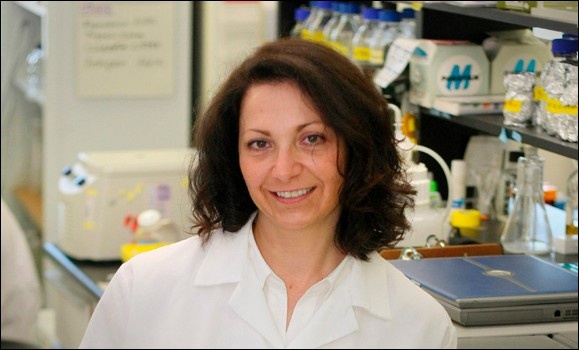News
» Go to news mainTurning off the power: Dr. Paola Marignani finds drug combination that stops growth of breast cancer cells

Dalhousie Medical School’s Dr. Paola Marignani and her team have successfully tested a combination of drugs that shuts down aggressive, metabolically active HER2-positive breast cancers.
“By combining the drugs, we were able to hit two critical pathways – the signals that tell cancer cells to grow, and the mitochondria that drive energy production within individual cancer cells,” notes Dr. Marignani, an associate professor in the departments of Biochemistry & Molecular Biology and Pathology.
“As a result, we found that both the size and overall number of tumours was dramatically reduced. In some cases, we even had a hard time finding tumours to analyze after the treatment was complete.”
This is a promising finding in the fight against HER2-positive breast cancer – a particularly aggressive form of breast cancer that makes up about one-fifth of all breast cancers and can be extremely difficult to treat. The study results were published in the current issue of the high-impact scientific journal, Oncotarget.
Dr. Marignani and her team have been on the trail of effective treatments for HER2-positive breast cancer for more than a decade. In 2009 and 2013, the scientists made key discoveries about the mechanisms of metabolically active HER2-positive breast cancer. Essentially, they found that this kind of cancer is very low in a tumour suppressor protein called LKBI, which is abundant in healthy breast tissue. From this discovery, they engineered a highly reliable mouse model of LKBI-negative, HER-2 positive breast cancer, published in 2013 in the scientific journal, PLOS ONE (see Dal news story).
A unique model
“We are very excited that we’ve been able to use our own unique mouse model of breast cancer to test a novel drug combination that’s showing such encouraging results,” says Dr. Marignani. “Because the drugs target specific growth-signal and energy-production pathways in the HER2-positive breast cancer cells, they’re able to effectively shrink tumours without harming healthy tissues – and may help prevent the cancer from recurring as well.”
The Dalhousie team tested AZD8055 and 2-DG. While both of these drugs are known (AZD8055 is being developed by Astra Zeneca and 2-DG is commonly used in research studies), they have never been used in combination in an animal model of cancer before.
“Used separately, we found that each drug was significantly effective against metabolically active HER2-positive breast cancer – but administering the two drugs together dramatically enhanced the cancer-killing effects,” Dr. Marignani says. “Now our goal is to find funding to move this discovery into clinical trials.”
Other applications
She adds that the drug combination may also prove effective against other forms of cancer with mechanisms similar to HER2-positive breast cancer.
Dr. Marignani’s research is funded by private donations through Dalhousie Medical Research Foundation’s Adopt-a-Researcher program and grants from the Beatrice Hunter Cancer Research Institute and the Nova Scotia Health Research Foundation.
Recent News
- Dal’s 2025 research awards
- Six accomplished individuals honoured as notable Dal alumni
- New hope for for Fabry patients
- New associate dean, UGME, Dr. Ian Epstein’s vision for medical education
- 2025 Picchione Symposium Confronts the Crisis in Maternal and Infant Health
- Dalhousie Medicine Opens Class of 2000 Time Capsule
- Partnership prompts 'I can be a doctor here' moments
- An order of magnitude: Ford Doolittle named Companion of the Order of Canada
